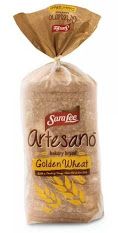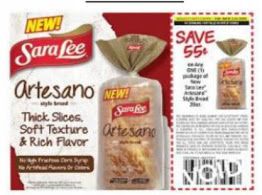In a 49-page decision, the Board affirmed a genericness refusal of the proposed mark ARTESANO for "pre-packaged sliced bread," but it reversed the USPTO's alternative mere descriptiveness refusal, finding that, if ARTESANO is not generic, it has acquired distinctiveness under Section 2(f). Applicant Bimbo argued that the doctrine of foreign equivalents does not apply because consumers will not stop and translate the foreign word "artisano." Bimbo also offered the results of a Teflon survey to show consumer perception. The Board disagreed as to the doctrine and pooh-poohed the survey results. In re Grupo Bimbo, S.A.B. de C.V., Serial No. 87408465 (April 14, 2021) (Opinion by Judge Marc A. Bergsman).

Genericness: The Board found that the genus at issue was adequately defined by Bimbo's identification of goods: pre-packaged sliced bread. [Does that mean it's packaged before it's sliced? - ed.]. The relevant public comprises ordinary consumers. The question, then, was "whether the relevant public understands that the term Applicant seeks to register primarily refers to that genus of goods."
The Board found that "the resemblance between ARTESANO and the word 'Artisan' is so evident in both sound and appearance that the average American consumer will automatically translate ARTESANO and equate ARTESANO and the word 'artisan.'"
The term ARTESANO in connection with "pre-packaged sliced bread" does not fall into one of the exceptions to the doctrine of foreign equivalents. First, the term ARTESANO does not have such a well-established meaning in the U.S. that even Spanish speakers would forego translating it. *** Second, as shown by the use of the term "Artisan Bread," the English translation of the term ARTESANO is relevant to consumers purchasing handcrafted bread.
The evidence, including dictionary definitions, website references, third-party usage, and Bimbo's own usage ("artesano style bread") established that "artisan bread" is a type of bread: i.e., handcrafted bread.

Bimbo submitted the results of a "Teflon" survey purporting to show that "55.2% of respondents identified ARTESANO as a brand name for the relevant goods (with a 5.7% margin of error), whereas only 23.7% identified it as a common name (with a 4% margin of error)." However, in Frito-Lay N. Am., Inc. v. Princeton Vanguard, LLC, 124 USPQ2d 1184, 1202-03 (TTAB 2017), the Board found that "Teflon surveys are ineffective at determining the true weight of public perception where the purported trademark owner previously did not control the term at issue as a coined or arbitrary term."
De facto distinctiveness is, of course, attained when an unregistrable term actually acquires secondary meaning through extensive use and promotion. The difference between de facto distinctiveness and so-called de jure distinctiveness is simply that de facto secondary meaning does not entitle a term to protection under the Lanham Act. No matter how much money and effort the user of the term has spent promoting the sale of its products and no matter how much the public has come to recognize the term as an indicator that the products come from the user of the term, the secondary meaning of the term is said to be de facto, and cannot be the basis for registration of a term that is so highly descriptive of the product that it is legally incapable of distinguishing the product from other similar products. In re E. I. Kane, Inc., 221 USPQ 1203, 1204 (TTAB 1984)
The Board found that Frito-Lay applies here because ARTESANO is the Spanish equivalent of the word "artisan," and "artisan" is a generic term for a type of bread. It is not a coined or arbitrary term. Therefore the Board accorded Bimbo's survey evidence "little probative value."
The Board concluded that "the primary consumer perception of the term ARTESANO is as the generic term for a type of bread (i.e., traditionally handcrafted bread)."
Acquired Distinctiveness: Assuming arguendo that ARTESANO is not generic, the Board addressed the alternative Section 2(e)(1) mere descriptiveness refusal. Based on the evidence provided by Examining Attorney Tamara Hudson, the Board found ARTESANO to be highly descriptive of pre-packaged sliced bread. Consequently, applicant's burden of proof under Section 2(f) was commensurately high.
Applying the Converse factors (adopted by the Board in SnoWizard), the Board found that applicant's Teflon survey was probative on the acquired distinctiveness issue. It noted that "[g]enerally, survey results showing over 50% brand recognition are sufficient to establish acquired distinctiveness." Moreover, Bimbo's extensive and and substantially exclusive use of the term since 2015, its substantial advertising expenditures and sales revenues, and unsolicited media coverage, supported its Section 2(f) claim.
The Board therefore concluded that the purported mark ARTESANO has acquired distinctiveness, and so it reversed the mere descriptiveness refusal.
Read comments and post your comment here.
TTABlogger comment: How does this decision hold up in light of the Supreme Court's Booking.com decision? In footnote 94, the Board states: "The sole challenge in Booking.com was that 'as a rule, combining a generic term with '.com' yields a generic composite.' Thus, the issue of whether the Board erred in its weighing of evidence was not before the Court." Thus de facto secondary meaning does not avoid genericness in the eyes of the TTAB.
The content of this article is intended to provide a general guide to the subject matter. Specialist advice should be sought about your specific circumstances.
